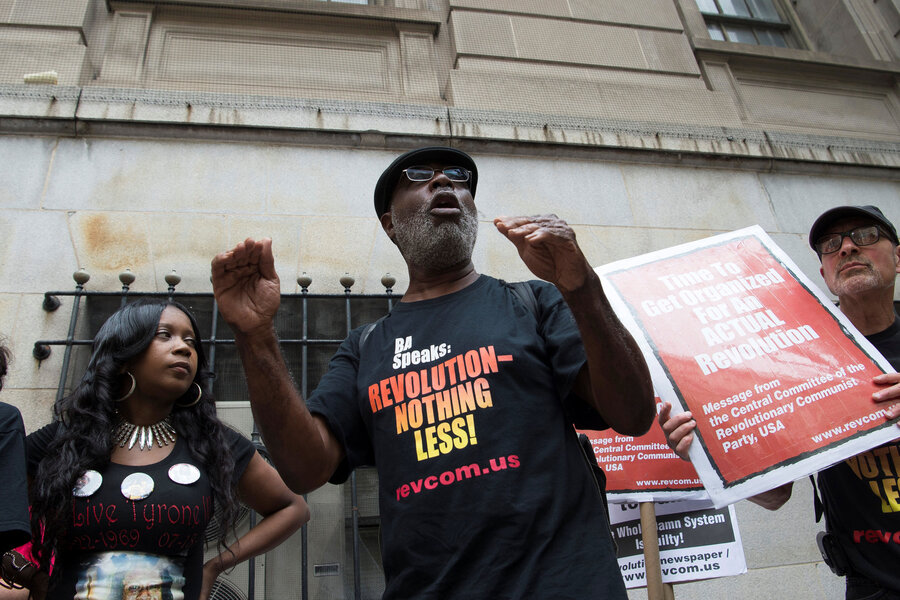In driver's acquittal, more of the same for those seeking justice for Freddie Gray
Loading...
The acquittal of all charges for the driver of the police van in which a 25 year-old black man, Freddie Gray, sustained fatal injuries last year has triggered a fresh round of questioning and calls for justice in Baltimore and beyond.
Baltimore Circuit Judge Barry Williams agreed that Mr. Gray had received the injuries inside the police van in which he was detained on a drive to the station, but acquitted Officer Caesar Goodson, the driver of the van who prosecutors said gave Gray a “rough ride” to “bounce him around in the back of the van.”
Judge Williams made the acquittal because he said the state had not provided solid evidence or witnesses.
"Here, the failure to seatbelt may have been a mistake or it may have been bad judgment," he said, "but without showing more than has been presented to the Court concerning the failure to seatbelt and the surrounding circumstances, the state has failed to meet its burden to show that the actions of the defendant rose above mere civil negligence."
However, for many in Baltimore and other observers already angered by the absence of prosecution in similar cases of black men's deaths at the hands of police, like that of Eric Garner on Staten Island, N.Y., and Michael Brown in Ferguson, Mo., Thursday’s decision has refreshed questions about justice and reform of police departments that many black communities don’t trust.
“I think people concerned about police misconduct in poor communities should not focus on whether there was a criminal conviction, because ultimately there are going to need to be other solutions to how we regulate police and make communities feel safe,” Dave Jaros, a University of Baltimore law professor who attended the trial, told the Christian Science Monitor’s Patrik Jonsson after the decision. “It does beg the question: If prosecutions and the use of criminal law are not the best way to regulate police conduct, then what are we going to do?”
Gray’s family admitted that there was a gap between justice for him and prosecution under the letter of the law.
Billy Murphy the lawyer representing the Gray family has already secured a $6.4 million civil settlement in the case, but described the family’s “immense frustration” at Officer Goodson’s acquittal.
"They hope for justice," he told the Associated Press, "whatever that is, and they know justice doesn't have guilty or not guilty attached to it."
Others also weighed in.
"It's a matter of fact that he was alive when he got in the van. It's a matter of fact that his spine was severed," DeRay Mckesson, a Black Lives Matter activist and former mayoral candidate, told the AP. "Six people contributed to that."
Following the ruling, Benjamin Jealous, former president of the NAACP, tweeted, "Maybe we should put the police van on trial for the death of #FreddieGray?"
Michaela Brown, an activist with the group Baltimore Bloc, called for major criminal justice reform.
"We need to stop saying the system is broken," she told the AP. "It is not broken; it is doing exactly what it was designed to do.... That is why we're not going to stop saying his name. We're not going to stop fighting until we see justice."
This is just one of several high-profile cases scheduled to be tried in coming months, as Mr. Jonson detailed following the ruling:
In South Carolina, prosecutors are readying a case against ex-North Charleston police officer Michael Slager, who can be seen on a video shooting Walter Scott in the back and then, prosecutors say, planting exonerating evidence near his body. In Chicago, Officer Jason VanDyke, who has been suspended without pay, is facing a first-degree murder charge in the shooting death of teenager Laquan McDonald.
Overall, 47 police officers were charged with murder or manslaughter for on-duty deaths by gun between 2005 and 2014. Last year saw 18 officers arrested, with six so far this year. Of those arrested for on-duty shootings, about 30 percent ended in convictions. But when the actions of off-duty officers are added to that roll, the conviction rate is around 70 percent – roughly what it is for the general population, says Philip Stinson, a criminologist at Bowling Green State University.
The news comes as a setback for the prosecution, with three of the six officers indicted in Gray’s murder now acquitted. While the indictments don’t go nearly far enough for many, to some they represent at least a glimmer of progress.
"At least the public will be able to see that battled out in the courtroom," Baltimore defense attorney A. Dwight Pettit told the Baltimore Sun last month. "For the first time, it is not swept under the rug."
This report contains material from the Associated Press.








